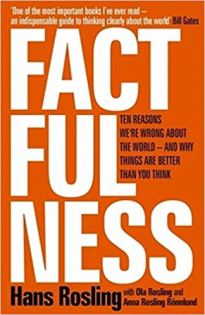
About the Book
Rosling was a great man.
Some may even have called him ‘Super Hans’.
(Sorry Peep Show fans – I couldn’t resist…)
In all seriousness, he truly was, and his work and lectures in the fields of development and statistics have helped thousands of people become better informed about our world.
I was first exposed to Rosling’s brilliant work a number of years ago through one of his TED talks on poverty and population growth. I loved his use of bubble charts and how he explained that living conditions are generally improving for millions of people.
Factfulness is an extension of this.
In his book, he discusses such ideas in greater detail. He does this with the help of what he calls the ten factfulness rules of thumb, or instincts:
- The Gap Instinct
- The Negativity Instinct
- The Straight Line Instinct
- The Fear Instinct
- The Size Instinct
- The Generalisation Instinct
- The Destiny Instinct
- The Single Instinct
- The Blame Instinct
- The Urgency Instinct
It’s a wonderful read and one which delivers far more value than you could ever imagine. Here are just a few of my highlights:
Favourite Passages:
- “‘Do you know why I’m obsessed with the numbers for the child mortality rate? It’s not only that I care about children. This measure takes the temperature of a whole society. Like a huge thermometer. Because children are very fragile…'” Chapter 1: The Gap Instinct
- “… just 20 years ago, 29 percent of the world population lived in extreme poverty. Now that number is 9 percent.” Chapter 2: The Negativity Instinct
- “Once parents see children survive, once the children are no longer needed for child labour, and once the women are educated and have information about and access to contraceptives, across cultures and religions both the men and women instead start dreaming of having fewer, well-educated children.” Chapter 3: The Straight Line Instinct
- “… ask yourself, ‘What kind of evidence would convince me to change my mind?’ If the answer is ‘no evidence could ever change my mind about vaccination,’ then you are putting yourself outside evidence-based rationality, outside the very critical thinking that first brought you to this point. In that case, to be consistent in your skepticism about science, next time you have an operation please ask your surgeon not to bother washing her hands.” Chapter 4: The Fear Instinct
- “Meanwhile, on Levels 2 and 3, roughly 2 billion menstruating women have few alternatives to choose from. These women don’t wear Lycra and won’t spend money on ultra-thin pads. They demand a low-cost pad that will be reliable throughout the day so they don’t have to change it when they are out at work. And when they find a product they like, they will probably stick to that brand for their whole lives…” Chapter 6: The Generalisation Instinct
- “She explains that not painting the walls can be a strategic decision in countries on Levels 2 and 3. It’s not that they can’t afford the paint. Flaking walls keep away the richer patients and their time-consuming demands for costly treatments, allowing hospitals to use their limited resources to treat more people in more cost-effective ways.” Chapter 6: The Generalisation Instinct
- “Africa is a huge continent of 54 countries and 1 billion people. In Africa we find people living at every stage of development… It makes no sense to talk about ‘African countries’ and ‘Africa’s problems’ and yet people do, all the time. It leads to ridiculous outcomes like Ebola in Liberia and Sierra Leone affecting tourism in Kenya, a 100-hour drive across the continent. That is farther than London to Tehran.” Chapter 6: The Generalisation Instinct
- “‘But come on. You are selling it for less than you bought it for.’// ‘That’s right. The Hungarians give us 30 days’ credit and UNICEF pays us after only four of those days. That gives us 26 days left to earn interest while the money is sitting in our account.'” Chapter 8: The Blame Instinct
- “Most of the human-emitted CO2 accumulated in the atmosphere was emitted over the last 50 years by countries that are now on Level 4. Canada’s per capita CO2 emissions are still twice as high as China’s and eight times as high as India’s. In fact, do you know how much of all the fossil fuel burned each year is burned by the richest billion? More than half of it. Then the second-richest billion burns half of what’s left, and so on and so on, down to the poorest billion, who are responsible for only 1 percent.” Chapter 8: The Blame Instinct
- “Crying wolf too many times puts at risk the credibility and reputation of serious climate scientists and the entire movement. With a problem as big as climate change, we cannot let that happen. Exaggerating the role of climate change in wars and conflicts, or poverty, or migration, means that the other major causes of these global problems are ignored, hampering our ability to take action against them. We cannot get into a situation where no one listens anymore. Without trust, we are lost.” Chapter 10: The Urgency Instinct
What Others Are Saying

Star Rating:
5/5
It’s such a shame Rosling is no longer with us but what a legacy he has left. The work he did on shedding light on global issues was masterful and Factfulness typifies this in all its glory.
I love how clear and easy to read it is, and there are so many moments within it which will make you go wow. One such moment for me was how a pharmaceutical is able to sell drugs to UNICEF for less than it costs to buy them! (See Chapter 8.)
Let’s hope Rosling’s efforts weren’t in vain…
All in all, a terrific read and one which I’ll be coming back to for many years to come!